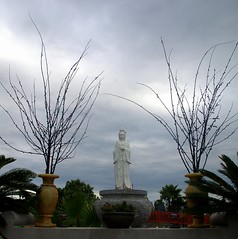Tuesday, December 23, 2008
Merry Christmas is Merry
Here's wishing everyone a happy holiday or holidays of their choice.
Friday, December 19, 2008
15 Degrees of Deconstruction
Iteration 1: The East Coast - New York, without borders, is the gateway, in more than just a geographical sense, between New England and the rest of the country.
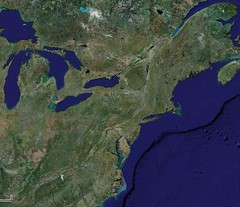
Iteration 2: New York and southern Canada- The Finger Lakes and the Adirondacks are clearly visible, taking up huge swaths of the state
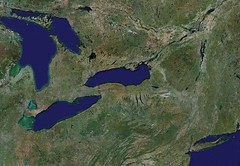
Iteration 3: Upstate NY - the vast amount of the state that is not in the City, to the continual suprise of the rest of the country. Cities become visible against a background of green and tan agriculture
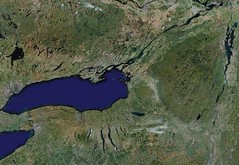
Iteration 4: Northern New York - bordered by Onondaga to the west, the great St. Lawrence River plain to the north, and the Adirondacks to the east, home was compromise between the extremes around it.
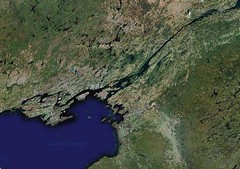
Iteration 5: the North Country- the scattershot placing of the Thousand Islands congregate at the meeting of the Lake and the River, at the same point as the meeting of countries.
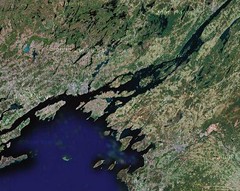
Iteration 6: the Frontier - as the farmland of the I-81 corridor falls away to the southwest, the land grows rugged and filled with massive glacial features and pathworked lakes as it follows the River to the Ocean. Place names become smaller, more disparate, an expanding universe even as our view contracts.
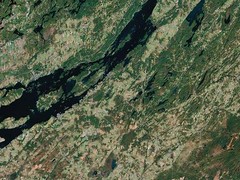
Iteration 7: Indian River valley - as with their larger counterparts, a new River and series of Lakes in the Theresa area take up the banner of crossroads at this new level. The lack of cultivation in the lakes area speaks equally to the changing character of the area as well as the ancient and indomitable forces underlyaing the land. This is a place in which humanity is at best in a fragile coexistence with the place it inhabits. There are no conquerors where survival hangs on a patched and coughing furnace holding back the winter cold.
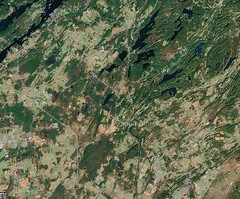
Iteration 8: Theresa - a tiny mill town whose heyday is as past as it was brief. a small settlement perched on a glacial wilderness. And a river runs through it, and connected us all.

Iteration 9: Southwest Theresa - two large areas of wetland surrounding Black Creek and tributaries to the Indian River meet along a narrow strip of rt. 37.
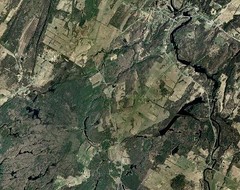
Iteration 10: Douglass Crossings Area - a hamlet, a few old houses stand sentinel around a crossroads, a gateway to the northern frontier for those traveling from Watertown. Completely dwarfed by the wilderness around it.
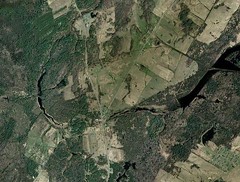
Iteration 11: Douglas Crossings - some houses come into view, and the railroad is more prominent. The thin connecting stream passes between the large swaths of undeveloped land.
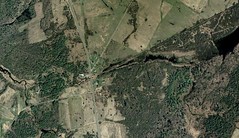
Iteration 12: Douglass Crossings south - the southern side of the small hamlet, a condensed monument to the town's frontier past...an old railroad's path, the remnants of a cheese factory (now making ice) to the NE, and the large stately farm manors built as a futile statement against the vast emptiness of the landscape.
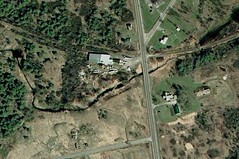
Iteration 13: The Douglass Mansion - a name as overly ambitious in describing the old farmhouse as the farmhouse itself is as an attempt to erect the permanence of civilization against the north country sky. An old Barn ruin speaks to its past, a new garage to the present. Even at this closeness, it is an incomprehensible distance from the psychic landscape of my childhood.
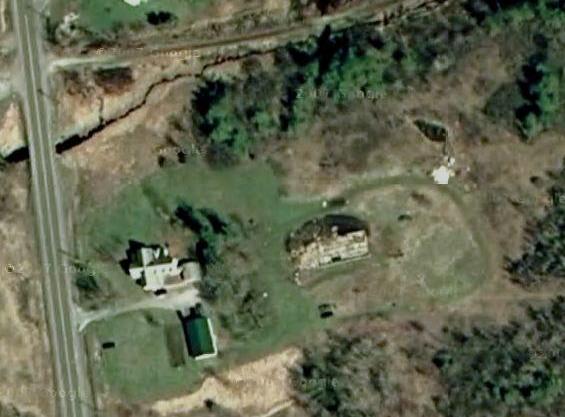
Iteration 14: You Can't Go Home Again - the motif again...at the crossroads of my past and future, at the intersection of the real landscape and the emotional one is a clear sign. You cannot go back, you cannot be where, and more importantly, when, you used to be. You can view it from afar, even while there, but we bear distance as our first child.
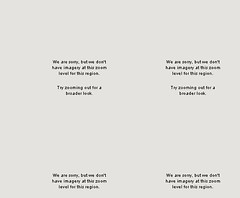
Iteration 15: Me
In our first years, we had a garden. Our parents were ambitious, they put their mark on the land. We dug into the dark fertile earth. I remember the smell...layered and old in the fall, moist and smelling of green growing things in the spring. But always rich. And from that soil grew corn, flowers, tomatoes until life got in the way and we let it go fallow again. I want to dig my way back through the years, to smell the richness of a time and place, to see it bear life again. I can't seem to get deep enough to find that fertile darkness anymore.
At the crossroads New England, at the crossroads of a Great Lake and a great River, at the crossroads of a river valley and the wilderness, at the crossroads of tributaries, at the crossroads of a hamlet, at the crossroads of a town and its past, is my crossroads.
Tuesday, December 16, 2008
My take on Paul (o' the Bible)
I have a fairly limited blog audience. 2, 3 at most. Of that vast throng of 3, at least 2 are deeply faithful Christian fellows whose posts are absolutely fantastic to read even when I don't necessarily agree, or, as is more often the case, have the slightest clue what they're talking about. (Hi Stan and Ben)
More often than not, it's somewhat akin to a quantum physics professor explaining string theory to a 1st grader. Yes, I know what string is. However, I don't think that is a qualifying factor to be in that discussion.I am not a learned fellow when it comes to the bible and the heaps of theological theory and discussion of the last couple millenia. So this post is the opposite, the 1st grader musing on string to the learned professors. Therefore I am on incredibly thin ice in writing this, but there's something that's always made me wonder about Paul...
Paul, or, Jesus's Pen Pal
Paul...so this Paul guy....he never actually meets Alive Jesus, he claims that Jesus appeared to him in a vision on a road trip post-resurrection. He then becomes the Stephen King of the bible, cranking out letters like nobody's business, some suggesting that he usually used a scribe to write most of the stuff down for him. I had to wiki him (see what I meant about biblical study?) to get the right number, but 14 epistles are attributed to him in the bible. 14!! Over half of the New Testament books...by one guy! That seems like an inordinate amount of influence for a single person. For this is compounded by the content; he's not just saying "Jesus did X, Jesus said Y", he's saying "this is what it MEANS/this is what you should DO". Since so much of modern Christian thought seems to derive from his interpretations/inspirations. And given how much of modern society is built around Christian theology, that makes him one of the more influential people in the last couple millenia. What he says makes up more books of the New Testament than the Gospels and actual direct quotes from the big J. Furthermore, scholars dispute (as scholars are apt to do) the authorship of about half of Paul's epistles, some going so far as to suggest that some of the epistles rode in on the coattails of having had Paul's name erroneously attached to them. I'm sure there are Paul fanboys who will take me to task on this. But wow...it just seems weird that the bulk of the books of THE BOOK for a religion are (potentially) authored by one guy interpreting the teachings of another guy he never met while that guy was teaching. factoring in the potential that some of those books may not have even been written by Paul, but slipped in with his name on them, then you have a situation in which you have a goodly number of parts of the Bible written by guys once or twice removed from the guy they're interpreting.
That blows my mind.
Biblical History
I don't write this to cast doubts on anyone's faith, or to try to prove a point, or put forth conspiracy theory. It's just an interesting thing to me, having been raised in a small town church where the teachings were simple, and direct, to really contemplate the history behind the Bible as a document, and the influences it has.
One of the concerns I always had in various journies of faith is the potential for pollution by human hands and human interests. I am certainly not someone of the conspiracy theory mindset that believes possibility = probability= fact. But given that the modern church, with a vastly greater array of societal checks and balances against it, still manages to monumentally flub up now and then (televangelists, catholic altar boy scandals, preachers preaching hate/bigotry/etc,) there's something that doesn't sit right with me in assuming that past church institutions, who racked up abuses in other aspects (no one expects the Spanish Inquisition!) were suddenly pure as the driven snow in terms of maintaining doctrinal integrity. Especially when they had motive and opportunity to nudge things to serve their interests.
I know many would say it was divine providence/guidance/protection, and that whatever made it into the Bible is untainted. I am not saying it is untrue..I am not qualified to make that argument...I'm talking about how it is perceived by folks like me who aren't coming in with the automatic, unquestioned assumpition that the Bible is unimpeachable as the Word o' God. Given the variety of interpretations existing now, and the willingness of different sects to promote their own interpretations, it at least FEELS unlikely (divine intervention notwithstanding) that the Bible made it through the initial years, official formulations, and countless translations of translations by folks with direct reasons to alter it to serve their purposes, without having things nudged here and there.
Paul really stands out to me as an example of the controversey, because, damn, he had a HUGE impact on how the early church got shaped. To me, he's symbolic of this issue with Biblical history (of the book iteself, not history as recounted in the Bible)...it's somewhat murky as to who wrote what, how it got accepted, why other things didn't get accepted, and to how it may have been subtly or not so subtly altered in the mean time.Having been on both sides of the fence, this seems like it's a point that Christians need to really understand when talking about the Bible with those who have doubts...If someone already doesn't have faith, I'm not sure how effective the assumption of the bible being untainted is at selling your point. Essentially, "You should have faith because of the teachings of this Book. And you should have faith in the Book because the book says you should, even if there's the appearance of the potential of impropriety...like one guy who never met Jesus writing (maybe) half the books of the New Testament, and, oh, yeah, the millenia of the human institution of the church potentially having its way with the Book"
That has to be a hard bridge to get someone to cross...to ask them to make a leap of faith not only in belief in a deity, but in belief that the deity's handbook hasn't been influenced by us silly humans who have had opportunity and motive to do so, and who have shown in this person's life that they are as fallible as the rest of us. Essentially a leap of faith that divine intervention occurred in the past, even though it doesn't seem to be occurring in the present. Maybe you guys, Stan and Ben, can comment on how you deal with that issue, how you see it. Like I said, just interesting to me, not a critique of Christian faith. I'm curious how those who evangelize/witness deal with this..
In any case, Paul remains the poster boy of this concpet for me. If any one person embodied the potential for influencing, purposefully or not, how we interpret the original teachings, it's Paul.
Tuesday, December 9, 2008
Brazos Bend State Park - 12/6/08 Photoshoot
Here's a couple shot.
Go to www.flickr.com/photos/jmbower for the full shoot.
Sunset over 40-Acre Lake barrier island
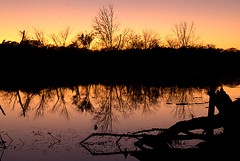
Tree with Venus

Black Birds over Golden Fields
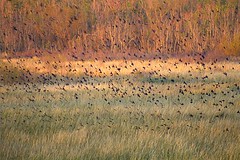
Last Light on Spanish Moss

Last Leaf of the Season

Afternoon Glow

Monday, December 8, 2008
9 trombones a-playing
So I was out shopping yesterday. I dislike shopping. I cannot emphasize enough how much "dislike" in that context is grossly underestimating my disdain for the sake of politeness. I had spent a grueling 45 minutes...(I'll pause to let the ladies, parents and more commerce oriented gentleman stop laughing uncontrollably..)..shopping at the frou frou shopping "destination" near us. (Imagine a strip mall that struck oil, packed up the family in a rickety old car, and moved to Bev-er-ly. The epitome of Houston) I finally made it to the semi-acceptable safe haven of Barnes and Noble.
As I opened the door, the ubiquitous Christmas music sounded different...warmer, fuller..somehow... As I stalked through the racks, I suddenly came in to a cleared area, face to face with....
9 trombones. Held by 9 trombonists. Playing Christmas music. (Quite handily.)
The surreality of it took me aback at first, but having been a trombone player in my formative years, I took a seat. I listened. There was no explanation, just a row or tw0 of chairs, and 9 trombonists belting out some beautifully warm brass music.
I couldn't help but smile. And relax.
The rest of the trip was a swirl of harsh lights, frenetic motion and price tags. But that five or ten minutes of 9 random trombones completely made my day. There were old trombonists, young trombonists, men, women, tall, short, round, thin, etc. It was a trombonic spectacle.
I don't even know why...maybe just passing sentimentality...a familiarity of sound, maybe just that the trombonists, while quite capable, weren't dressed or appointed as puffed up professionals. It looked like a community band, or just a group of random trombonists who had miraculously met and decided to hold an impropmtu concert. It was a little piece of home and past and I thank them for it.
I have a sneaking suspicion that if you massed enough trombonists in any one place, you'd be well on your way to solving something.
Friday, November 21, 2008
I can see the red taillights, heading for Spain
They rented out a sprawling villa on the side of a hill in a gently mountainous area northeast of Barcelona (near Pavol de Revardit, near Girona, for those keeping score). About as close to the northern border as you can get without eating snails. The villa had sweeping views of the rolling Spanish countryside, and was a proper maze of wonderful old rooms and hidden areas, as well as a fantastic terrace. Coupled with a week of amazing local bread, cheese, wine, etc, it was relaxation writ large.
Most of the stay involved leisurely breakfasts, equally leisurely day trips (Barcelona, Figueres, Girona, Besalu, volcanoes in Olot, etc) and long festive meals reaching deep into the early morning hours. There was a lot of wine to be had, and so we did. The pace of life lulled one into a stress-free routine that was hard to break out of upon returning. The stay at the villa ended with a wonderfully intimate wedding and dinner.
Kate and I then struck out on our own, and headed for the coast. We stayed in picturesque Cadaques for our honeymoon, a whitewashed fishing/tourist village along the Mediterranean, close to the most northwestern point in Spain. The rugged and bizarrely twisted rock landscape would have been ominous if not for the glowing afternoon sun. We celebrated our anniversary in the cozy nook of a seaside cafe on a windy Mediterranean evening. If you ever happen to be in Cadaques in the winter months, go to Cafe Nun and try the duck.
All in all, a very relaxed vacation, as opposed to the usual go go go se everything in the guidebook sort of deal.
Pictures are presented below, courtesy of Picasa web albums. For full size versions, please visit my Flickr site at www.flickr.com/photos/jmbower
Wednesday, November 5, 2008
A terrible beauty is born
I can only hope the Democrats resist the urge to be as blatantly partisan, lacking in transparency, and appealing to the lowest common denominator as the last adminstration was. Now is not a time for gloating, it's a time for moving forward.
Free at last, in so many ways.
Free from 8 years of tyranny,
freer from the haunting ghosts of our racial past...
With apologies to WB Yeats,
we are changed, changed utterly.
A terrible beauty is born.
Monday, October 6, 2008
Industrial Art
Part of my forray into field work involved an assessment of a municipality's water and wastewater infrastructure...its water plants, wastewater (sewage) treatment plants, and the sewage lift stations that made up the systems. I was picked largely because I had a camera with me.
Of course, I was not going to let an opportunity to get paid to take pictures go by, so even as I was working to get accurate data and pictoral information I also tried to add some artistic intent to the shots.
So here you go, industrial art (click to see full size versions):
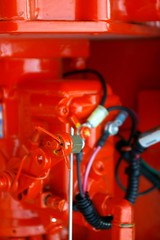
"Innards" -Mobile Lift Station Pump, interior.

"Bastion" - Interior Curve of Stormwater Clarifier

"Resolve" - Flagless, slightly-leaning Pole

"Creeping Decay" - Flooded Clarifier Pump Well
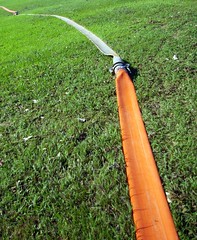
"Lifeline" - Hose array for lift station repumping setup

"Laying Down Lives" - semi-permeable paving at lift station access drive

"Probe" - Elevated water storage tank

"Fell Like Snow" - Remnants of vegetative screening at lift station
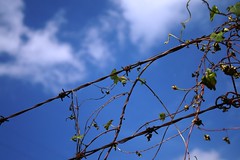
"Reclamation" - creeper vines taking over barbed wiring at a water plant fencing juncture
Tuesday, September 23, 2008
Revamping the Electoral College
N.B. This is NOT an argument for getting rid of the electoral college. Read on.
Now don't get me wrong, I support the electoral college. It's an important embodiment of the federal nature of the government, representing that states as entities, etc etc etc. I understand why a straight direct vote doesn't work. However, I think the "winner takes all" method of dividing electoral votes is neither necessary, nor in line with the fundamental principles the college and its architects envisioned for this great democracy.
The current system gives the whole of a state's electoral votes to the candidate with the greatest percent of the popular vote. That means a 51%/49% split gets represented as a 100% win. This is a perennial gripe in states like my native NY, who are largely red outside of the NYC area and select other cities. In fact, a look at the final returns from the last election shows that few if any states are all or nothing for one candidate, and the overwhleming majority are very close to 50/50 splits, with a point or two making the difference.
(http://www.electoral-vote.com/ is a great non-partisan resource for straight data without spin/influence.)
So we wind up with a situation where a state is "red" or "blue" based on a couple percentage points, rather than an overwhelming mandate from its citizens.
The inherent problem is not the college itself, which ensures that states are not completely overshadowed by spatial distribution of population by region, etc. This is a worthwhile and necessary thing. however, the "winner takes all" way of dividing the electoral votes IS NOT NECESSARY TO SERVE THIS PURPOSE.
The assumption I hold to be false is that a state can only vote one way or the other...like an individual. I cannot split my vote, so the traditional thinking is, that as a state is an entity under the federal system, either can it. I completely disagree, because that concept runs smack dab upside the head of the more fundamental concepts of the democracy..one man, one vote, et al. A state is an entity as far as interaction with the national government over spheres of influence, but I would hold that it is not a voting entity. Even under the current system, the "state" as an entity is not deciding a vote, it is merely reporting the result of the outcome of the REAL voting entities, the people. If the political subdivision as entity theory was sound, then each successive level of government would in effect represent its own voting entity. Each municipality, each county, each senatorial district, and so on, each with their own electoral college, etc. This is not the case. Certainly the state as an entity in our federal system is unique from these poltiical subdivisions, but not, I would argue, in the sense that it represents a voting entity. Its uniqueness derives from the general division of regulatory powers. As the election is for a national office, and as the standard unit of voting is "one man", the state's unique status in the federal system in terms of regulatory powers does not impart on it a presumptive right to supercede the individual citizen's expressed right to exercise their vote. In essence, under the US federal system, I would argue that the true division of government is among three parties, the national/federal government, the state governments, and the individual. This is the trinity, as it were, or centuries of legal precedent in other realms. For some reason, however, when it comes to the electoral college, the state usurps to some degree the rights held by the individual.
So we are left with two competing interests:
1) the states' interest in the original intent of the electoral college, i.e., to ensure that the non-uniform nature of population distribution is mitigated to some degree by ensuring that every state has at least SOME (though NOT equal) say in the electoral process, as is also mirrored in the setup of the Senate to a more pronounced degree, and;
2) the indivudal's interest in exercising their vote on the national level without impedance by the state, i.e. to have their vote count at the national level, and not be lost in the winner takes all decision made on the state level.
While this would seem to represent an either/or argument for the existence of the electoral college in general, I would argue that the two aims are ONLY incompatible under the current "winner takes all" system. I would also go further to argue that that system is not necessary to meet the interest of the states, and is the antithesis of meeting the interests of the individual.
So what to do?
Proportionate Representation (the Purple State Solution)
My idea, which has undoubtedly been thrown about for centuries before it popped into my humble head, is for states to divide their electoral votes based on the outcome of the total vote in that state. Any remainder would go to the "winning" party of that state.
Example: California's total vote comes out as 58% democrat, 42% republican. California has 55 EVs. Ordinarily that would mean the Dems pocket all 55 EVs. However, under a proportional representation setup, the electoral votes would be split up as Dems 31.68 (58 % of the 55 EVs) and Republicans 23.31 % (42% of the 55 EVs). To stick with whole votes, the sum of the remainders is given to the higher percentage. The Dems got a higher percentage, so they would recieve 32 votes, and the Reps, 23.
Under this system, the actual "voice" of the voters in any given state, and at the national level, is more truthfully represented. Because the NUMBER of EVs a state gets doesn't change, the states' interest regarding representation is still entact. Essentially, California still casts the electoral votes, it just doesn't have to cast them all for one person. The substantial chunk of republicans in california whose voice rarely is heard becomes important.
I believe this system is vastly superior to the current system because of the following benefits:
1) The one man, one vote concept is held true at all levels, while at the same time keeping the original intent of the EC intact.
2) many states (like NY, CA, TX, etc) are perenially won by the same party, leaving the voters of the other party with what essentially amounts to no say in a national election, contrary to the individual voter being the essential unit of said national election. Republican voters in NY don't often get the chance to influence a national election, as the state almost invariably goes blue.
3) The national election and campaigns truly become national, with each candidate having to fight for votes in every state, not just "battleground states". To be truly successful, a candidate now has to appeal not just to one select set of demographic categories or regions, but to all of them.
4) related to #4, the venemous and increasingly polarized partisanship of a winner takes all system in which "red and blue" states is the determining factor is diminshed in effectiveness. In a sea of purple states (red AND blue) a more moderate/centrist approach becomes more viable.
5) As per the original intent of the EC to mitigate some degree of the spatial disparity of population distribution on the national level, a proportional system would help ensure that the same mitigation takes places on the state level. States seldom have uniform population distribution, and party affiliation in most states closely mirrors spatial distribution. Therefore, the same fear the states/regions had about representation on the national level at the outset is valid for individuals within a state. A republican farmer in upstate NY suffers the same isolation from the decision-making process on the state level (in terms of the national election) as some states feared they would. While the electoral college serves to partially mitigate that, and the Senate allocation continues to do so, there is no such protection for the individual within a state, under the winner takes all system. There is greater protection under proportional representation, because it essentially renders spatial distribtion moot.
6) a Two-party system has lead to a considerable entrenchment and polarization of the platforms of the two parties and the nation. The ability to gain EVs without winning a state will open the doors for greater participation by third parties, and thus greater participation for the constituents who support them.
In essence, proportional representation offers a more valid accounting of the will of both the states and the nation. Since states by defintion in our federal system, are separated by their regulatory spheres, not a status as a voting entity, and as they are already represented in that capacity in the Senate, the states' interests are not diminshed. If anything, proportional represnetation serves the same goal on the state level that the EC in general serves on the national level.
I realize this is a mental exercise, and not much else. We are firmly entrenched in our current system, and greater minds than I can probably tear my argument to shreds. However, to me there is an underlying spirit to the great American experiment in democracy. That spirit is one of equality under the law, and the unalienable status of each indivudal in relation to his government. Even against a sea of rhetoric and semantics in support of "winner takes all", I cannot help but feel it is wholly unable to be reconciled with this fundamental American spirit.
Cliffs notes: I think the "winner takes all" system of allcoating electoral votes from states (in which all votes go to the winning party regardless of what % they won by) is antithetical to the fundamental concepts the country was founded on, and am arguing that electoral votes should be divied up by the % a party won in a given state, with any remainder (less than full electoral vote) going to the "winning" party of that state. I argue that this supports both the fundamental prupose of the EC as well as the fundamental role of the individual in the national election. In the spirit of transparency, I am an independent, consider myself fairly moderate, and will be voting for Obama this election. However, what I have suggested here is not for the benefit of a political party (in fact, this system would favor the republicans currently), but for the nation as a whole.
Thursday, September 11, 2008
I (don't) Like Ike.
For all three of you who might actually see this, we're getting ready for a hit from an actual storm. Prayers, good thoughts, etc welcome.
This is my timeline.
Thursday:
8 AM - assigned to the Emergency Operations Center. Ike is looking like it's hooking our way. We got complacent after the last couple misses, and Ike had originally looked to hit further down the coast. No such luck. I have a friend flying in from Germany tonight. Poor fellow. Kate has a half day, and the day off tomorrow. Again, no such luck here. I'm "essential personnel".
11 AM - staffing the emergence command center. Not half as exciting as it sounds. The tracking models show us getting a direct hit. Tomorrow starts a series of 12 hour shifts. There's soemthing to look forward to. Apparently all the local stores are wiped clean. So I'll have maybe 5 hours to completely get our apt. ready before being at work for an indefinite amount of time. There's a stack of resumes I've been meaning to send out. Right now they are laughing cruelly at me.
12:30 PM - Storm growing more menacing, but free lunch. Universe is in balance for the moment.
4 PM - Still manning the emergency operations center...imagine a smaller version of the NASA ground control room..rows of monitors and computers, very impressive...just on a much smaller scale. Itching to get home and start boarding things up.
10 PM - A long day work done, apartment as storm prepared as it will be. Very anxious. Looking to be a direct hit without hope of reprieve. We've had a lot of close calls, and they're a bit of a "it could have been" thrill. But this one just feels bad all around. May be a sleepless night.
Friday
8 AM - We wake up to what sounds like continual rain, but on inspection, it's just the air conditioner outside kicking over on high. It's actually a beautiful morning. Small wispy clouds and bright sunshine. We're still planning on sheltering in place. Emails from friends are pouring in. Concerns are being drowned in a large breakfast.
10:45 AM - Looks like we'll be on the "clean /west side of the storm, but still pretty close to the eye. This will definitely be an e-ticket ride. Lots of friends sending well wishes and invites. We set up three potential evacuation targets, at three other friends houses, and are well stocked for food, water, and beer. I have been taking pictures of our view from the apt. every few hours , and will post them when I get a chance.
1 PM - We make the decision to stay at the apartment. We have several options, including two houses. However, given considerations of distance (and ability to get back) and large trees in the area (we just have tiny crepe myrtles here). We took a drive around our apartment complex...everyone still seems to be here, and only a couple windows are boarded up. The massive supermarket in the shopping center across the street is still pretty hopping. The sun came out for a little, although clouds are now starting to be prevalent. There is a light breeze.
3 PM - I'd say the waiting is the worst part, but I'll save that judgment for the aftermath. We have filled up a bathtub with water and have supplies ready to go if we need to run at any point.
5:45 - We are starting to get preparation fatigue....one can only prepare and worry for so long before it becomes pretty tiring. We actually went out for a walk on a greenway trail nearby. The wind is kicking up a bit, with a few more clouds, but nothing drastic. There is something ...wrong in the air. Nothing you could put your finger on it, just a harbinger of unraveling of the social fabric. Something not quite right, just a bit off. Something wicked this way comes... But for now we're really a bit bored. I feel horrible that I have a friend visiting this weekend...what a way to guarantee someone never comes back:) Lunch was almost surreal...we had a very nice sit down lunch, it just seemed so civilized in a chaotic time. Dinner will probably be the same...might even go out..there are still neighborhood restaurants open...bizarre. My friend and I go for a walk, even in the gathernig wind, at the local park. To add to the oddness, we are caught in a police raid around a house we have parked by, and are required to stay in our car while the pd question us. They eventually ascertain we have nothing to do with whatever's going on, and let us go after some questions. We go for our walk anyway.

7:30 PM - We eat dinner. It's so odd that something so banal seems so extraordinary. It was quite a nice simple dinner. With cookies. The wind has picked up fairly significantly. The sunset was fantastic tonight. Like clouds torn to shreds, moving at different speeds, a million little facets reflecting the setting sun. Large, horizon-long dark cloud arms are spiraling along the curve of the earth. Impressive, but cowing at the same time. There are a lot of people still out and about at the complex.

9:30 PM - The storm is still heading for us dead on. We'll be slightly on the clean side, but still under the large eye area. We're somewhat heartened that the prevailing winds seem to be coming from the north (as air is sucked into the counterclockwise flow from the upper left quadrant of the storm.) our exposed windows are to the south, so our balcony seems fairly sheltered. On looking across the parking lot, we can see trees whipping back and forth, but on the proch there is no air disturbance. It's a magical porch/alcove. I feel slightly better about the windows. I feel even better realizing we have two bags of cookies and plenty of milk. We can hear the howling of the wind in the fireplace, but also the howling of neighbors drinking their way through the storm. As long as the sounds compete I think we're doing well.
Saturday Morning
12:30 AM - The storm is howling, but not horribly so. We still have the magic balcony effect, which baffles me to this day. Around this point we're all up, all bored, and I decide to get an hour or two of sleep before the storm "really" hits.
~3-4 AM - The storm hits. I wish I could relate to you the intensity of the winds but I cannot. I was asleep.
5:30 AM - I finally wake up. My wife and friend let me sleep through the storm. So in the middle of a roaring hurricane, I slept like a baby. We have a small breakfast and watch the storm outside. It continues to rage, but it seems we're not getting the worst of it. Occasionally there are somewhat disturning sounds outside of things falling off roofs, or ripping sounds. However, our building seems to be standing.
6-10 AM - With the power out, there's not that much to do. We read a bit, watch the storm, and sleep on and off. Sometime after the storm begins to subside in the late morning, I go out to survey the damage. We make out pretty well...our building loses a few shingles, little siding. Our apartment is a-OK. Some of the other buildings are a little worse for wear, with large gaping holes where the siding has ripped off. Only a few of the trees are down. We have no power or water, but things are going pretty well, all considering. I pick up a small piece of siding as a souveneir, and plan to mount a picture of the storm on it and label it appropriately.
Late Morning/Early Afternoon - We venture out in blatant disregard to check out a friend's house down the street. A big tree portion is down, but they made out ok too. Lots of trees down all over, but very little structural damage outside of roof shingles/siding. We spend the rest of the morning and afternoon walking about our complex and surveying the damage and hanging about. I have to work that night, so I get prepped for what could be an extended shift.
6:00 PM - We get power back. This is nothing short of divine intervention, given that some 2 million people are without power. We are in an area that is a large commerical hub for many major oil companies (the offices, not the refineries:)) so apparently we get lucky and get power back asap. We didn't even realize we had power until the ice maker in the freezer kicked on. We had apparently turned off all the lights by accident as we were flicking switched on and off by force of habit during the outtage. We flick them on and off again, enjoying the incredible basking glow of electric coolness. I am tempted to plug in and turn on every major appliance in blatant symbolic defiance of the outtage, but decide against it.
6:30 PM - I leave to go down to Sugar Land for my shift in emergency operations. I will be working the 7pm to 7am shift in the command bunker which is far less exciting than it sounds. I realize it does not sound exciting to begin with. The highway is torn up pretty badly, with billboards shredded and pretty much every light out. Traffic is horrendous.
7:00 PM - I start my shift. I and seven or 8 other departmental representatives hunker down for night, as we begin to coordinate the picking up of the multitude of pieces. Our water system is untouched. Our sewer system...not so much.
Sunday morning
12:30 AM - With little going on in the emergency center outside of the occasional phone call, we watch the news coverage nonstop. This leads to weariness. Weariness leads to hunger. Hunger leads to the dark side. Luckily, someone discovers a stash of donated quarter-pounders. Goodness and mirth are restored. Many important people dash about now and again, holding important meetings and issuing important statements. I pretty much take phone calls and make phone calls. My lack of importance remains assuaged by my bounty of quarter pounders.
7:00 AM - I go off shift after a morning briefing. Things are bad, but not terrible. The City is back on its feet and moving toward normalcy. On the west side, we get the least of things, even though the hurricane was a direct hit on our area. It has begun to rain hard, though. While the storm brought wind and rain, we were on the "clean side" so the wind was prominent. However, the sheer size and speed of Ike managed to suck OTHER storms into its wake and drag them behind it. So after the primary storm passed, we get hit with a pretty intense deluge.
8:00 AM - I arrive home, in the midst of rain so hard my wipers can't keep up. The streets of our complex that drained the hurricane rain away just fine are now almost full to the top of the curb with water. I park at the front and wade my way home.
Sunday day - We continue to lounge about, not doing much of anything. I only end up sleeping 2 or 3 hours after I get home, but don't feel too bad. of all the things damaged by the storm, the big honking sattelite hookup for the complex came through just fine. Amazingly enough, my friend's flight goes out close to on time the next day. That night we go out and find a restaurant already open (although we don't have water at that point). We actually have a choice. While we're eating, we pass the time the City curfew is set for. We are not expectionally worried since there are actually police officers eating one table away from us. They depart about a half hour after the curfew is over, saying nothing to the patrons or owner. However, no more than five minutes afterward, a DIFFERENT cop shows up, and closes the place down and threatens us all with fines. Of course, as he's doing this, traffic is whizzing by on the street behind us. We are about finsihed anyway, so just decide to go home. o
Monday - My friend leaves to go to NYC, and I go to work. Our offices got flooded so we are a nomad unit for the moment, set up temporarily in a spare conference room. Cleanup and restoration is well under way, with debris being the main issue, not counting the general lack of power in the area. I begin to realize how lucky I was regarding electricity. We get our water back too, leaving us pretty well off.
Monday through Thursday - I spend the week rushing here and there at various emergency related duties. I assess infrastructure damage, make reports, smell more lift stations (sewer) than I ever care to again, and work 12 hour shifts.
Friday - A week after the storm hit, my part in it is over. Friday is my day off, and I finally geta chance to start cleaning up the apartment and getting back to normalcy.
It wasn't the Hollywood disaster movie we feared, but nor was it the tame pass from Rita several years ago. We have survived our first (Cat 2) hurricane, none the worse for wear. we turn our eye to the next forming systems in the Gulf...
Wednesday, August 27, 2008
Downtown Houston Photowalk
I went on a ~4 hour photowalk along the Buffalo Bayou near downtown, watched the bats come out from under Waugh Bridge (not half as cool as Austin's) and sojourned around downtown proper. Overwhelming heat + bad backup tripod + bad shoes + 140% humidity did not make for a good photo session, but I came out with a few interesting shots.
As always, click on image to see full sized version, and "all rights reserved" applies to all pictures in this post and others.
Houston Skyline
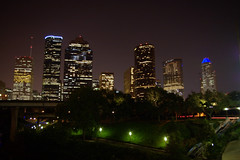
Underpass Lighting
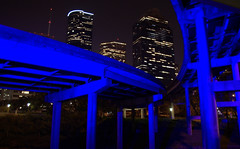
Skyline from Pedestrian Bridge
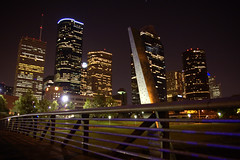
Pennzoil Building

Statuary with Skylines- Illumination
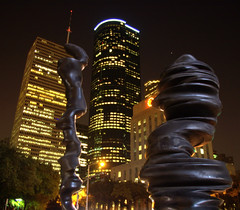
Flag Abstract
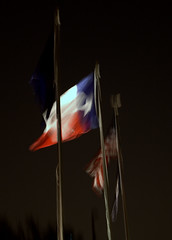
Friday, August 22, 2008
Vietnam, Sugar Land Style
However, the demographics of Sugar Land are bizarrely diverse, including a fairly large and thriving southeast Asian population. (particularly Vietnamese and Indian/Pakistani communities) This has lead to equally bizarre but fascinating cultural juxtapositions.
To the north of Sugar Land is a strip of land between the City limits and the city limits of Houston. It is in the "extraterritorial jurisdiction" ( a vague developmental quasi jurisidctional area on the outskirts of a municipality) of Houston and/or unincorporated county. That means all the draconian development codes of Sugar Land do not apply. In this strip of land are a hodge-podge of metalwork shops, used car parts lots, ramshackle Mexican churches, barren lots, and, with increasing frequency, temples and religious centers of all manner and variety.
There are, within only several hundred feet, two vietnamese buddhist centers, a muslim center, and other assorted and as-of yet-unidentified-sects' facilities. Driving between golden mosque domes and Buddhist stautary is is almost as if someone had cut and paste temple grounds from a dozen different countries with neither rhyme nor reason.
The most impressive is the Vietnamese Buddhist center whose impressive grounds include, among other things, a 72 foot tall statue of the Quan Am, a Buddhist (deity?). Regardless of one's religous leanings, it is nothing short of inspiring to find such elegant beauty amidst what is essentially a wasteland of sprawl.
Click on the Images below to see Full Size Versions

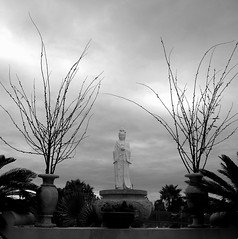



(color version of a previous shot)
